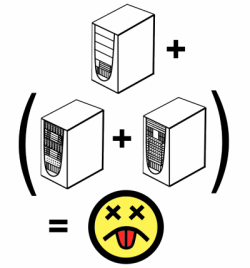 |
 |
Resolver Systems - developers of Resolver One, an Excel-compatible spreadsheet designed for reliability that's programmable in Python, easily integrates with .NET, and comes with a built-in Web server. Give it a shot, make an awesome spreadsheet, and send it in to win the $25,000 Resolver One Challenge! |
 |
 |
Aurigma - developers behind Image Uploader, a cross-platform component that delivers a user-friendly interface (thumbnail generation, folders, etc.) for uploading multiple image files. |
 |
 |
CounterSoft - makers of Gemini, the software that enables you to log, assign and progress ALL your project issues: Bugs, Enhancements, New Features, Risks, Change Requests, Quality Checks, Support Tickets and more. Now with a free, 5-user license. |
 |
 |
DotNetRemoting - a communication framework that allows you to easily build bidirectional network applications for Windows, Web, Mono, and PDA platforms. |
 |
 |
Infosoft Global - the developers behind the seriously impressive FusionCharts v3: interactive and data-driven charts, gauges, and maps for web applications. Reasonably priced (starting at $69), fairly licensed, and cross-platform, it's certainly worth checking out their free trial. |
 |
 |
Fsck VPS - straight-forward Linux VPS hosting by geeks, for geeks: root access, no strangeness, decent hardware, and as much virtual coffee as you can drink. Plans starting at $9.95/mo and, with coupon code WTF, get 50% off your first month. |
 |
 |
Software Verification - software engineering tools for memory leak detection, code coverage, performance profiling, thread lock contention analysis and thread deadlock detection, flow tracing and application replay on the Windows Vista, 2003, XP, 2000 and NT platforms. |
 |
 |
Springloops - unique source code management tool focused on web development teams. Code in parallel, share your code safely, and concentrated on results, not on lost changes or overwritten files. Sign-up for a free trial or a complete free account, and see how it makes great things simple. |
 |
 |
A Sane Approach to Database Design - the book that tells you how to build a smart database, with lots of examples of people who did it wrong. And although the irish girl has nothing to do with database design, I certainly appreciate keeping up the tradition. |
 |
 |
MindFusion - a great source for flow-charting and diagramming components for a variety of platforms including .NET, WPF, ActiveX and Swing |
 |
 |
Mosso - massively scalable hosting for .NET (2,3,3.5) PHP, Ruby, etc., with unlimited sites & mailboxes, simple online provisioning, and an enterprise clustered platform that's supported by real people. |
 |
 |
SlickEdit - makers of that very-impressive code editor and some pretty neat Eclipse and VisualStudio.NET tools and add-ins, some of which (Gadgets) are free. Check out this short video highlighting just one of SlickEdit's Visual Studio integration features. |
 |
 |
SoftLayer - serious hosting provider with datacenters in three cities (Dallas, Seattle, DC) that has plans designed to scale from a single, dedicated server to your own virtual data center (complete with racks and all) |
 |
|
The Non-WTF Job Board - Powered by HiddenNetwork, it features some great job opportunities like:
|

 Dec 08
Dec 08 Having worked with several companies as a systems administration consultant, Massimo had learned that one cliché is, in fact, true: the bigger they are, the harder their bureaucracies are to navigate*. When his employer sent him to work with their biggest client – a large government agency – he was prepared to deal with endless TPS Reports, Process for Application Implementation and Navigation documents, and Form Request Forms. But there was one thing he did not expect: that little asterisk at the end of the cliché.
Having worked with several companies as a systems administration consultant, Massimo had learned that one cliché is, in fact, true: the bigger they are, the harder their bureaucracies are to navigate*. When his employer sent him to work with their biggest client – a large government agency – he was prepared to deal with endless TPS Reports, Process for Application Implementation and Navigation documents, and Form Request Forms. But there was one thing he did not expect: that little asterisk at the end of the cliché. At my daytime corporate-type job, if I need to even sneeze in the general direction of a production environment, I need both a managerial and customer approvals with documentation solemnly stating that I thoroughly tested my changes and swear on a stack of MSDN licenses and O'Reilly books that I am NOT going to break anything as a result of my changes. Sure, the whole thing is a pain (and admittedly, a necessary evil), but what Bruce W. has to go through beats the pants off of anything I've ever had to go through.
At my daytime corporate-type job, if I need to even sneeze in the general direction of a production environment, I need both a managerial and customer approvals with documentation solemnly stating that I thoroughly tested my changes and swear on a stack of MSDN licenses and O'Reilly books that I am NOT going to break anything as a result of my changes. Sure, the whole thing is a pain (and admittedly, a necessary evil), but what Bruce W. has to go through beats the pants off of anything I've ever had to go through.













 It was a little past 4AM when Massimo's support pager went off, jarring him awake. Without even looking at the pager or logging into his laptop, he flipped on the television to Channel 242: the Video on Demand channel for the Italian TV broadcaster that he worked for.
It was a little past 4AM when Massimo's support pager went off, jarring him awake. Without even looking at the pager or logging into his laptop, he flipped on the television to Channel 242: the Video on Demand channel for the Italian TV broadcaster that he worked for. "All right, Jory, we're gonna start you off simple here, kid!" Jory B.'s boss was a large man with forearms like hairy hams, and he spoke in a gruff, deep, and loud voice. "Yer gonna learn about The Aggregator by adding a simple feature. I want it to be sendin' emails whenever someone signs up at one of our locations!" He continued on his throaty, saliva-y explanation of what should appear in the emails, which mail server to use, and so on. "Welcome aboard, kid," he said warmly, extending a hand with fingers that looked like sausages.
"All right, Jory, we're gonna start you off simple here, kid!" Jory B.'s boss was a large man with forearms like hairy hams, and he spoke in a gruff, deep, and loud voice. "Yer gonna learn about The Aggregator by adding a simple feature. I want it to be sendin' emails whenever someone signs up at one of our locations!" He continued on his throaty, saliva-y explanation of what should appear in the emails, which mail server to use, and so on. "Welcome aboard, kid," he said warmly, extending a hand with fingers that looked like sausages. Before Curtis even got to sit down at his desk, he was accosted by a frenzied, sweating junior developer. "OhmygodCurtis," he began. Curtis extended his hand in a "calm the hell down" gesture and allowed him to continue. "A whole bunch of our stores had no data posted last night and I'm not sure why orwhat to doabout it or whoIshouldtalktoand-" Curtis gestured again, to which the developer handed him a thin stack of papers. After a deep breath, the developer continued. "It's a list of the stores that didn't post last night."
Before Curtis even got to sit down at his desk, he was accosted by a frenzied, sweating junior developer. "OhmygodCurtis," he began. Curtis extended his hand in a "calm the hell down" gesture and allowed him to continue. "A whole bunch of our stores had no data posted last night and I'm not sure why orwhat to doabout it or whoIshouldtalktoand-" Curtis gestured again, to which the developer handed him a thin stack of papers. After a deep breath, the developer continued. "It's a list of the stores that didn't post last night." Tyson wasn't used to 8:00am meetings, let alone meetings with the not-so-technical-even-though-their-name-implies-it Application Auditors on the dimly lit 32nd floor. Arriving fashionably late at 8:06, he was struck by how many suits were in the meeting with him - and he'd again opted not to shave.
Tyson wasn't used to 8:00am meetings, let alone meetings with the not-so-technical-even-though-their-name-implies-it Application Auditors on the dimly lit 32nd floor. Arriving fashionably late at 8:06, he was struck by how many suits were in the meeting with him - and he'd again opted not to shave. When Glen Sommers was hired to add some features to a Cold Fusion based web application for a non-profit organization, he wasn't surprised by the quality he found, instead he expected it.
When Glen Sommers was hired to add some features to a Cold Fusion based web application for a non-profit organization, he wasn't surprised by the quality he found, instead he expected it. Jim B. stared wistfully in the mirror at the wrinkles near his eyes and the few stray gray hairs that he’d accumulated over the last six months. On the way back to his desk, he stopped by his friend Mike's desk. “Point three six,” he said as he banged his head against Mike's cubicle wall. “Point three six.”
Jim B. stared wistfully in the mirror at the wrinkles near his eyes and the few stray gray hairs that he’d accumulated over the last six months. On the way back to his desk, he stopped by his friend Mike's desk. “Point three six,” he said as he banged his head against Mike's cubicle wall. “Point three six.”